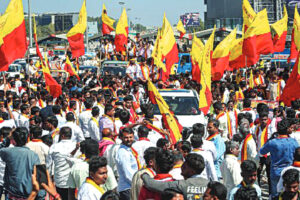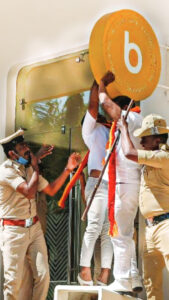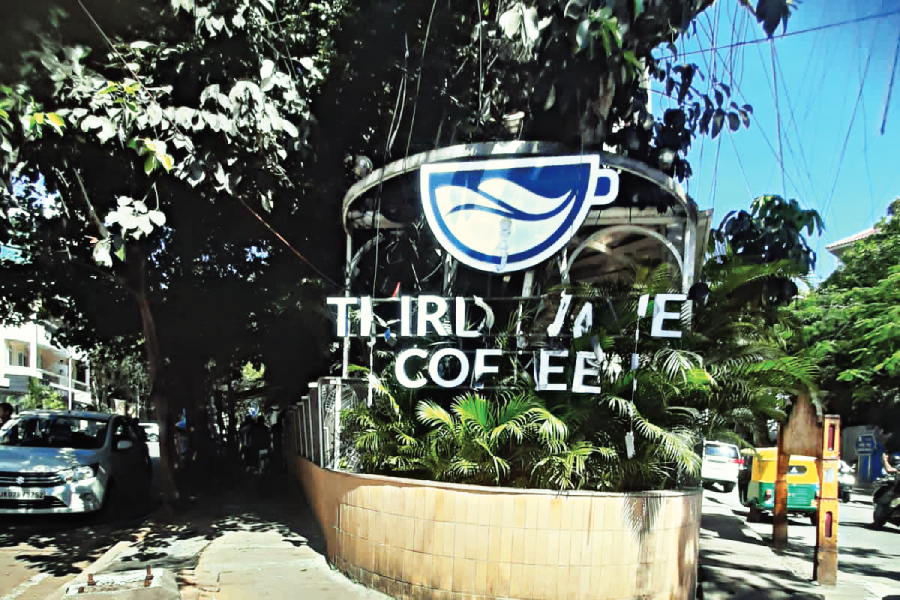Vandalism by a fringe group demanding 60% Kannada in commercial signages sparks a renewed language debate in Bangalore. Explore the complexities of the issue as Bangaloreans weigh in
- May 13, 2024
- Updated 5:49 pm
Signboard Saga
- Shivani Venugopal
- January 7, 2024
- Cover Story
Amidst vandalism fallout, Bangalore grapples with language tensions. Explore diverse perspectives, cultural pride, and political responses shaping the city’s identity discourse
The language row in Karnataka recently escalated sharply after retailers in Bangalore were caught off guard as mobs took to the streets, vandalising non-Kannada signboards.
The orchestrated chaos, led by the Karnataka Rakshana Vedike (T A Narayana Gowda faction), an organisation pushing for Kannada language, followed an announcement by the Bruhat Bengaluru Mahanagara Palike (BBMP) mandating that all signboards must prominently feature a minimum of 60% Kannada text, allowing the remaining 40% for any language.
In the aftermath, law enforcement took swift action, arresting and remanding 29 activists of the Karnataka Rakshana Vedike, including its president Narayana Gowda, to 14-day judicial custody.
The condemnable acts of vandalism not only triggered widespread criticism for their misguided display of linguistic pride, but also prompted Chief Minister Siddaramaiah to denounce the attack.

“Anyone can protest peacefully, but damage to public or government property will not be tolerated,” the Chief Minister stressed, announcing the introduction of an ordinance mandating 60% Kannada language in signage, with all establishments required to comply by February 28.
Tangadagi Shivaraj Sangappa, Minister of Kannada and Culture, echoed CM’s sentiments, informing that the culture department is holding Kannada learning workshops for non-Kannada speakers and requested all non-Kannadigas to be a part of this initiative of their own volition.
Debate heats up
As talks progress on implementing the 60% Kannada mandate with the BBMP, police officials, and the Home Department working together, Our Bangalore aimed to understand the city’s sentiments – uncover the reasons behind the frequent language disputes and capture the pulse of the city.
Amit Parthasarathi, currently employed in the United States, recently visited his hometown to spend time with his family. Coming from a defence background and having travelled extensively during his formative years in the North and Northeastern parts of India, his return to Bangalore proved to be a cultural shock.
Reason? Majority of the people were conversing in Hindi, “disrobing the city of its natural flavour”. While Amit termed the activists act as small-minded bigots destroying public property in the guise of language pride, he could see the region’s identity eroding.
“While Bengaluru lives up to its reputation of being a cosmopolitan city and embraced all; had people taken baby steps to learn the language, it would have been an added advantage of an inclusive feeling,” he opines. Though a Tamil, Amit was determined to walk the talk by conversing in Kannada with the help of his tween nephew till the time he was in the Garden City.
Another Bangalorean, Revathy Ashok, CEO & Managing Trustee of B.PAC, expresses deep distress over the vandalism carried out by “misguided” individuals in the name of language, causing societal distress.
This behaviour, she feels, contradicts the strong, distinctive ethos of the IT city, rooted in principles of peace and harmony.
“This kind of behaviour detracts from our regional identity as a peaceful, welcoming, accepting culture that has significantly contributed to Bangalore’s global city brand. We have numerous beautiful avenues, such as art, theatre, food, dance, and music, to express our unique regional identity. At the same time, Bangaloreans are all eager to learn French, German, Spanish, and Japanese. How hard is it to learn a little bit of conversational Kannada? People need to make the effort!” she stresses, criticising the police for their passive role in the situation.
Archana Das (name changed on request), from Odisha is a lawyer by profession and has worked in cities like Mumbai and Kolkata before moving to Bangalore. Das feels that the current issue has been politicised way out of proportion.
“If the erosion of cultural identity is attributed to not learning Kannada, that premise is fundamentally flawed. Condescending attitudes from auto drivers and colleagues do not contribute to upholding the cultural identity of a region. Instead, embracing tradition is the key to promoting a region’s culture, as opposed to coercing language learning. Inclusivity fosters a sense of belonging, naturally motivating individuals to make genuine efforts to learn the language. This approach, rather than imposing the learning of Kannada on others, is the true path to preserving one’s cultural identity,” she says.
T.V. Mohandas Pai, Chairperson of Manipal Global Education, expressed his displeasure at the vandalism, stating that fringe groups engage in such acts to “attract attention as they are involved in businesses that compel them to resort to these things.”
“Sadly, the police turned the other way and didn’t step in. The government and the police should have taken action,” he says.

He also believes that since Bangalore has a large number of migrants due to the opportunities the city offers, people should show respect to the local community as a gesture of being a good citizen.
“It’s always an advantage to learn the local language, which brings a feeling of belonging wherever you are. Speak Bengali in Bengal and Tamil in Tamil Nadu. When Germans, Chinese, and French can do it, why can’t we? I don’t see any need for hesitation to have signboards in the local language,” asserts Pai.
Setting aside the vandalism issue, Dr Sandeep Shastri, Political Scientist and VC of Jain University, identifies two key reasons for the recurrent language disputes in Karnataka: the increase in immigration driven by economic development and the categorisation of Hindi as a symbol of North Indian domination.
“Bangalore is undergoing significant transformation, marked by a surge in immigration from the North and Northeast. The Kannada-speaking population, not necessarily a majority now, experiences a sense of discomfort, prompting a perceived need to safeguard the place and pride of Kannada. In Bangalore, the issue is not opposition to Hindi or any language but a resistance to its association as a symbol of North Indian influence. The pro-Kannada stance is a way of asserting against perceived domination by Hindi and North India,” he says.

